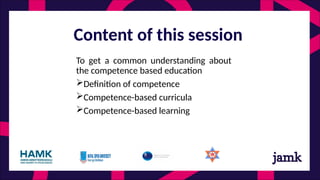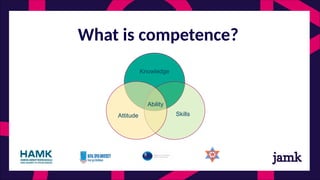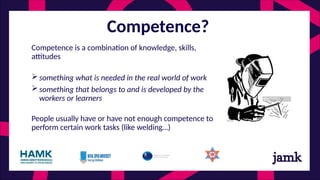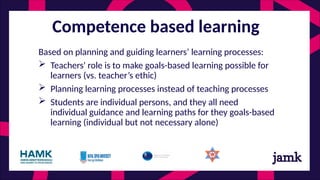Competence based learning for competitive
- 1. 21st CS Nepal Competence based learning Monday 22nd Feb 2021 at 10.00-11.30 (1.45-3.15) Viivi Virtanen (HAMK) and Tauno Tertsunen (HAMK)
- 2. Content of this session To get a common understanding about the competence based education ’āśDefinition of competence ’āśCompetence-based curricula ’āśCompetence-based learning
- 3. In order to achieve higher quality and meet the changing competence demands of the society and the world of work -> We need to rethink teaching and learning! ŌĆó UNESCO, ILO, OECDŌĆ” ŌĆ£Education is the most powerful weapon which you can use to change the worldŌĆØ (Nelson Mandela)
- 4. Education in the future? ’āś What are the needs of the society? ’āś What are the needs of the world of work? ’āś What are the 21st century skills? ’āś Education 4.0? ’āś Competence based thinking? ’āś Artificial intelligence and learning?
- 6. Graduate competence: The Future of Education and Skills: OECD Education 2030 Framework https://www.oecd.org/education/2030/E2030%20Position%20Paper%20(05.04.2018).pdf
- 7. Competence? Competence is a combination of knowledge, skills, attitudes ’āś something what is needed in the real world of work ’āś something that belongs to and is developed by the workers or learners People usually have or have not enough competence to perform certain work tasks (like weldingŌĆ”)
- 8. Online-ŌĆØpollingŌĆØ Your ideas and opinions about the of Education in Nepal nowadays and in the future? Link to quiz: joinmyquiz.com And the code is: 356360
- 9. Competence-based curricula vs Subject-based curricula? Subject-based: ’āśPlanning teaching processes ’āśFocus on input ’āśA list of subject and content, like: ’āś Mathematics, Chemistry,ŌĆ” ’āś algebra, organic chemistry, ŌĆ” ’āśPlanning teaching activities ’āśTeacher- / Teaching-centered Competence-based: ’āśPlanning learning processes ’āśFocus on output ’āśDescription of competences, like: ’āś The student can weld ŌĆ” ’āś The student can serve ŌĆ” ’āśPlanning learning activities ’āśLearner- / Learning-centered
- 10. Competence based learning Based on planning and guiding learnersŌĆÖ learning processes: ’āś Teachers' role is to make goals-based learning possible for learners (vs. teacherŌĆÖs ethic) ’āś Planning learning processes instead of teaching processes ’āś Students are individual persons, and they all need individual guidance and learning paths for they goals-based learning (individual but not necessary alone)
- 11. Alignments of the implementation and the goals of training ’āś Will the planned learning processes make learning, based on learnersŌĆÖ learning goals, possible? ’āś Do we as teachers choose the matching pedagogical models and learning activities (teaching methods) for each learning situation ’āś Can learners learn to weld by reading books and watching videos?
- 12. Teaching / Learning process Phase 1 Phase 2 1 2 3 Phase n = learning activities = face to face meetings = learning materials = online meetings = small group working = guiding and assessing x
- 13. Small group working What are the main challenges to organize competence-based online education in Nepal nowadays?












